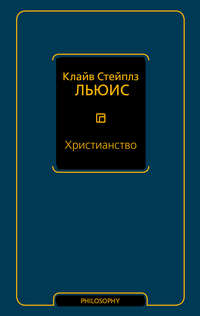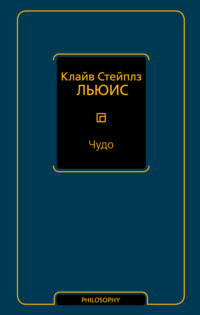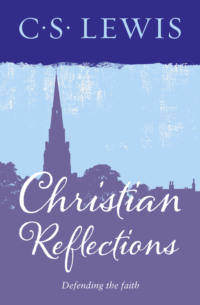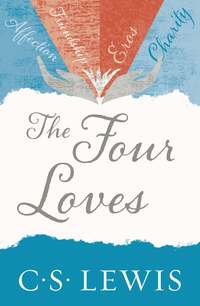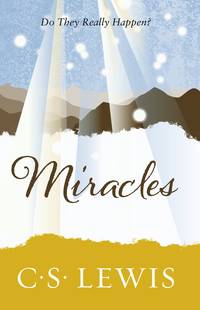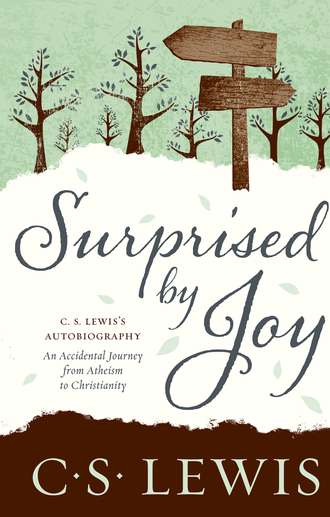
Полная версия
Surprised by Joy
It will be clear that at this time - at the age of six, seven, and eight - I was living almost entirely in my imagination; or at least that the imaginative experience of those years now seems to me more important than anything else. Thus I pass over a holiday in Normandy (of which, nevertheless, I retain very clear memories) as a thing of no account; if it could be cut out of my past I should still be almost exactly the man I am. But imagination is a vague word and I must make some distinctions. It may mean the world of reverie, day-dream, wish-fulfilling fantasy. Of that I knew more than enough. I often pictured myself cutting a fine figure. But I must insist that this was a totally different activity from the invention of Animal-Land. Animal-Land was not (in that sense) a fantasy at all. I was not one of the characters it contained. I was its creator, not a candidate for admission to it. Invention is essentially different from reverie; if some fail to recognise the difference that is because they have not themselves experienced both. Anyone who has will understand me. In my day-dreams I was training myself to be a fool; in mapping and chronicling Animal-Land I was training myself to be a novelist. Note well, a novelist; not a poet. My invented world was full (for me) of interest, bustle, humour, and character; but there was no poetry, even no romance, in it. It was almost astonishingly prosaic.1 Thus if we use the word imagination in a third sense, and the highest sense of all, this invented world was not imaginative. But certain other experiences were, and I will now try to record them. The thing has been much better done by Traherne and Wordsworth, but every man must tell his own tale.
The first is itself the memory of a memory. As I stood beside a flowering currant bush on a summer day there suddenly arose in me without warning, and as if from a depth not of years but of centuries, the memory of that earlier morning at the Old House when my brother had brought his toy garden into the nursery. It is difficult to find words strong enough for the sensation which came over me; Milton’s ‘enormous bliss’ of Eden (giving the full, ancient meaning to ‘enormous’) comes somewhere near it. It was a sensation, of course, of desire; but desire for what? not, certainly, for a biscuit-tin filled with moss, nor even (though that came into it) for my own past. ‘Ioū(íav no(?1 - and before I knew what I desired, the desire itself was gone, the whole glimpse withdrawn, the world turned commonplace again, or only stirred by a longing for the longing that had just ceased. It had taken only a moment of time; and in a certain sense everything else that had ever happened to me was insignificant in comparison.
The second glimpse came through Squirrel Nutkin; through it only, though I loved all the Beatrix Potter books. But the rest of them were merely entertaining; it administered the shock, it was a trouble. It troubled me with what I can only describe as the Idea of Autumn. It sounds fantastic to say that one can be enamoured of a season, but that is something like what happened; and, as before, the experience was one of intense desire. And one went back to the book, not to gratify the desire (that was impossible - how can one possess Autumn?) but to re-awake it. And in this experience also there was the same surprise and the same sense of incalculable importance. It was something quite different from ordinary life and even from ordinary pleasure; something, as they would now say, ‘in another dimension’.
The third glimpse came through poetry. I had become fond of Longfellow’s Saga of King Olaf: fond of it in a casual, shallow way for its story and its vigorous rhythms. But then, and quite different from such pleasures, and like a voice from far more distant regions, there came a moment when I idly turned the pages of the book and found the unrhymed translation of Tegner’s Drapa and read
I heard a voice that cried, Balder the beautiful Is dead, is dead -
I knew nothing about Balder; but instantly I was uplifted into huge regions of northern sky, I desired with almost sickening intensity something never to be described (except that it is cold, spacious, severe, pale, and remote) and then, as in the other examples, found myself at the very same moment already falling out of that desire and wishing I were back in it.
The reader who finds these three episodes of no interest need read this book no further, for in a sense the central story of my life is about nothing else. For those who are still disposed to proceed I will only underline the quality common to the three experiences; it is that of an unsatisfied desire which is itself more desirable than any other satisfaction. I call it Joy, which is here a technical term and must be sharply distinguished both from Happiness and from Pleasure. Joy (in my sense) has indeed one characteristic, and one only, in common with them; the fact that anyone who has experienced it will want it again. Apart from that, and considered only in its quality, it might almost equally well be called a particular kind of unhappiness or grief. But then it is a kind we want. I doubt whether anyone who has tasted it would ever, if both were in his power, exchange it for all the pleasures in the world. But then Joy is never in our power and pleasure often is.
I cannot be absolutely sure whether the things I have just been speaking of happened before or after the great loss which befell our family and to which I must now turn. There came a night when I was ill and crying both with headache and toothache and distressed because my mother did not come to me. That was because she was ill too; and what was odd was that there were several doctors in her room, and voices, and comings and goings all over the house and doors shutting and opening. It seemed to last for hours. And then my father, in tears, came into my room and began to try to convey to my terrified mind things it had never conceived before. It was in fact cancer and followed the usual course; an operation (they operated in the patient’s house in those days), an apparent convalescence, a return of the disease, increasing pain, and death. My father never fully recovered from this loss.
Children suffer not (I think) less than their elders, but differently. For us boys the real bereavement had happened before our mother died. We lost her gradually as she was gradually withdrawn from our life into the hands of nurses and delirium and morphia, and as our whole existence changed into something alien and menacing, as the house became full of strange smells and midnight noises and sinister whispered conversations. This had two further results, one very evil and one very good. It divided us from our father as well as our mother. They say that a shared sorrow draws people closer together; I can hardly believe that it often has that effect when those who share it are of widely different ages. If I may trust to my own experience, the sight of adult misery and adult terror has an effect on children which is merely paralysing and alienating. Perhaps it was our fault. Perhaps if we had been better children we might have lightened our father’s sufferings at this time. We certainly did not. His nerves had never been of the steadiest and his emotions had always been uncontrolled. Under the pressure of anxiety his temper became incalculable; he spoke wildly and acted unjustly. Thus by a peculiar cruelty of fate, during those months the unfortunate man, had he but known it, was really losing his sons as well as his wife. We were coming, my brother and I, to rely more and more exclusively on each other for all that made life bearable; to have confidence only in each other. I expect that we (or at any rate I) were already learning to lie to him. Everything that had made the house a home had failed us; everything except one another. We drew daily closer together (that was the good result) - two frightened urchins huddled for warmth in a bleak world.
Grief in childhood is complicated with many other miseries. I was taken into the bedroom where my mother lay dead; as they said, ‘to see her’, in reality, as I at once knew, ‘to see it’. There was nothing that a grown-up would call disfigurement - except for that total disfigurement which is death itself. Grief was overwhelmed in terror. To this day I do not know what they mean when they call dead bodies beautiful. The ugliest man alive is an angel of beauty compared with the loveliest of the dead. Against all the subsequent paraphernalia of coffin, flowers, hearse, and funeral I reacted with horror. I even lectured one of my aunts on the absurdity of mourning clothes in a style which would have seemed to most adults both heartless and precocious; but this was our dear Aunt Annie, my maternal uncle’s Canadian wife, a woman almost as sensible and sunny as my mother herself. To my hatred for what I already felt to be all the fuss and flummery of the funeral I may perhaps trace something in me which I now recognise as a defect but which I have never fully overcome - a distaste for all that is public, all that belongs to the collective; a boorish inaptitude for formality.
My mother’s death was the occasion of what some (but not I) might regard as my first religious experience. When her case was pronounced hopeless I remembered what I had been taught; that prayers offered in faith would be granted. I accordingly set myself to produce by willpower a firm belief that my prayers for her recovery would be successful; and, as I thought, I achieved it. When nevertheless she died I shifted my ground and worked myself into a belief that there was to be a miracle. The interesting thing is that my disappointment produced no results beyond itself. The thing hadn’t worked, but I was used to things not working, and I thought no more about it. I think the truth is that the belief into which I had hypnotised myself was itself too irreligious for its failure to cause any religious revolution. I had approached God, or my idea of God, without love, without awe, even without fear. He was, in my mental picture of this miracle, to appear neither as Saviour nor as Judge, but merely as a magician; and when He had done what was required of Him I supposed He would simply - well, go away. It never crossed my mind that the tremendous contact which I solicited should have any consequences beyond restoring the status quo. I imagine that a ‘faith’ of this kind is often generated in children and that its disappointment is of no religious importance; just as the things believed in, if they could happen and be only as the child pictures them, would be of no religious importance either.
With my mother’s death all settled happiness, all that was tranquil and reliable, disappeared from my life. There was to be much fun, many pleasures, many stabs of Joy; but no more of the old security. It was sea and islands now; the great continent had sunk like Atlantis.
1 For readers of my children’s books, the best way of putting this would be to say that Animal-Land had nothing whatever in common with Narnia except the anthropomorphic beasts. Animal-Land, by its whole quality, excluded the least hint of wonder.
1 Oh, I desire too much.
2 CONCENTRATION CAMP
Arithmetic with Coloured Rods.
Times Educational Supplement, 19 November 1954
Clop-clop-clop-clop … we are in a four-wheeler rattling over the uneven squaresets of the Belfast streets through the damp twilight of a September evening, 1908; my father, my brother, and I. I am going to school for the first time. We are in low spirits. My brother, who has most reason to be so, for he alone knows what we are going to, shows his feelings least. He is already a veteran. I perhaps am buoyed up by a little excitement, but very little. The most important fact at the moment is the horrible clothes I have been made to put on. Only this morning - only two hours ago - I was running wild in shorts and blazer and sandshoes. Now I am choking and sweating, itching too, in thick dark stuff, throttled by an Eton collar, my feet already aching with unaccustomed boots. I am wearing knickerbockers that button at the knee. Every night for some forty weeks of every year and for many a year I am to see the red, smarting imprint of those buttons in my flesh when I undress. Worst of all is the bowler-hat, apparently made of iron, which grasps my head. I have read of boys in the same predicament who welcomed such things as signs of growing up; I had no such feeling. Nothing in my experience had ever suggested to me that it was nicer to be a schoolboy than a child or nicer to be a man than a schoolboy. My brother never talked much about school in the holidays. My father, whom I implicitly believed, represented adult life as one of incessant drudgery under the continual threat of financial ruin. In this he did not mean to deceive us. Such was his temperament that when he exclaimed, as he frequently did, ‘There’ll soon be nothing for it but the workhouse,’ he momentarily believed, or at least felt, what he said. I took it all literally and had the gloomiest anticipation of adult life. In the meantime, the putting on of the school clothes was, I well knew, the assumption of a prison uniform.
We reach the quay and go on board the old ‘Fleetwood boat’; after some miserable strolling about the deck my father bids us good-bye. He is deeply moved; I, alas, am mainly embarrassed and self-conscious. When he has gone ashore we almost, by comparison, cheer up. My brother begins to show me over the ship and tell me about all the other shipping in sight. He is an experienced traveller and a complete man of the world. A certain agreeable excitement steals over me. I like the reflected port and starboard lights on the oily water, the rattle of winches, the warm smell from the engine-room skylight. We cast off. The black space widens between us and the quay; I feel the throb of screws underneath me. Soon we are dropping down the Lough and there is a taste of salt on one’s lips, and that cluster of lights astern, receding from us, is everything I have known. Later, when we have gone to our bunks, it begins to blow. It is a rough night and my brother is sea-sick. I absurdly envy him this accomplishment. He is behaving as experienced travellers should. By great efforts I succeed in vomiting; but it is a poor affair - I was, and am, an obstinately good sailor.
No Englishman will be able to understand my first impressions of England. When we disembarked, I suppose at about six next morning (but it seemed to be midnight), I found myself in a world to which I reacted with immediate hatred. The flats of Lancashire in the early morning are in reality a dismal sight; to me they were like the banks of Styx. The strange English accents with which I was surrounded seemed like the voices of demons. But what was worst was the English landscape from Fleet-wood to Euston. Even to my adult eye that main line still appears to run through the dullest and most unfriendly strip in the island. But to a child who had always lived near the sea and in sight of high ridges it appeared as I suppose Russia might appear to an English boy. The flatness! The interminableness! The miles and miles of featureless land, shutting one in from the sea, imprisoning, suffocating! Everything was wrong; wooden fences instead of stone walls and hedges, red brick farmhouses instead of white cottages, the fields too big, haystacks the wrong shape. Well does the Kalevala say that in the stranger’s house the floor is full of knots. I have made up the quarrel since; but at that moment I conceived a hatred for England which took many years to heal.
Our destination was the little town of - let us call it Belsen - in Hertfordshire. ‘Green Hertfordshire’, Lamb calls it; but it was not green to a boy bred in County Down. It was flat Hertfordshire, flinty Hertfordshire, Hertfordshire of the yellow soil. There is the same difference between the climate of Ireland and of England as between that of England and the Continent. There was far more weather at Belsen than I had ever met before; there I first knew bitter frost and stinging fog, sweltering heat and thunderstorms on the great scale. There, through the curtainless dormitory windows, I first came to know the ghastly beauty of the full moon.
The school, as I first knew it, consisted of some eight or nine boarders and about as many day-boys. Organised games, except for endless rounders in the flinty playground, had long been moribund and were finally abandoned not very long after my arrival. There was no bathing except one’s weekly bath in the bathroom. I was already doing Latin exercises (as taught by my mother) when I went there in 1908, and I was still doing Latin exercises when I left there in 1910; I had never got in sight of a Roman author. The only stimulating element in the teaching consisted of a few well-used canes which hung on the green iron chimney-piece of the single school-room. The teaching staff consisted of the headmaster and proprietor (we called him Oldie), his grown-up son (Wee Wee), and an usher. The ushers succeeded one another with great rapidity; one lasted for less than a week. Another was dismissed in the presence of the boys, with a rider from Oldie to the effect that if he were not in Holy Orders he would kick him downstairs. This curious scene took place in the dormitory, though I cannot remember why. All these ushers (except the one who stayed less than a week) were obviously as much in awe of Oldie as we. But there came a time when there were no more ushers, and Oldie’s youngest daughter taught the junior pupils. By that time there were only five boarders, and Oldie finally gave up his school and sought a cure of souls. I was one of the last survivors, and left the ship only when she went down under us.
Oldie lived in a solitude of power, like a sea-captain in the days of sail. No man or woman in that house spoke to him as an equal. No one except Wee Wee initiated conversation with him at all. At meal times we boys had a glimpse of his family life. His son sat on his right hand; they two had separate food. His wife and three grown-up daughters (silent), the usher (silent), and the boys (silent) munched their inferior messes. His wife, though I think she never addressed Oldie, was allowed to make something of a reply to him; the girls - three tragic figures, dressed summer and winter in the same shabby black - never went beyond an almost whispered ‘Yes, Papa,’ or ‘No, Papa,’ on the rare occasions when they were addressed. Few visitors entered the house. Beer, which Oldie and Wee Wee drank regularly at dinner, was offered to the usher but he was expected to refuse; the one who accepted got his pint, but was taught his place by being asked a few moments later in a voice of thunderous irony, ‘Perhaps you would like a little more beer, Mr N.?’ Mr N., a man of spirit, replied casually, ‘Well, thank you, Mr C, I think I would.’ He was the one who did not stay till the end of his first week; and the rest of that day was a black one for us boys.
I myself was rather a pet or mascot of Oldie’s - a position which I swear I never sought and of which the advantages were purely negative. Even my brother was not one of his favourite victims. For he had his favourite victims, boys who could do nothing right. I have known Oldie enter the schoolroom after breakfast, cast his eyes round, and remark, ‘Oh, there you are, Rees, you horrid boy. If I’m not too tired I shall give you a good drubbing this afternoon.’ He was not angry, nor was he joking. He was a big, bearded man with full lips like an Assyrian king on a monument, immensely strong, physically dirty. Everyone talks of sadism nowadays but I question whether his cruelty had any erotic element in it. I half divined then, and seem to see clearly now, what all his whipping-boys had in common. They were the boys who fell below a certain social status, the boys with vulgar accents. Poor P. - dear, honest, hard-working, friendly, healthily pious P. - was flogged incessantly, I now think, for one offence only; he was the son of a dentist. I have seen Oldie make that child bend down at one end of the school-room and then take a run of the room’s length at each stroke; but P. was the trained sufferer of countless thrashings and no sound escaped him until, towards the end of the torture, there came a noise quite unlike a human utterance. That peculiar croaking or rattling cry, that, and the grey faces of all the other boys, and their deathlike stillness, are among the memories I could willingly dispense with.1
The curious thing is that despite all this cruelty we did surprisingly little work. This may have been partly because the cruelty was irrational and unpredictable; but it was partly because of the curious methods employed. Except at geometry (which he really liked) it might be said that Oldie did not teach at all. He called his class up and asked questions. When the replies were unsatisfactory he said in a low, calm voice, ‘Bring me my cane. I see I shall need it.’ If a boy became confused Oldie flogged the desk, shouting in a crescendo, ‘Think - Think - THINK!!’ Then, as the prelude to execution, he muttered, ‘Come out, come out, come out.’ When really angry he proceeded to antics; worming for wax in his ear with his little finger and babbling, ‘Aye, aye, aye, aye …’ I have seen him leap up and dance round and round like a performing bear. Meanwhile, almost in whispers, Wee Wee or the usher, or (later) Oldie’s youngest daughter, was questioning us juniors at another desk. ‘Lessons’ of this sort did not take very long; what was to be done with the boys for the rest of the time? Oldie had decided that they could, with least trouble to himself, be made to do arithmetic. Accordingly, when you entered school at nine o’clock you took your slate and began doing sums. Presently you were called up to ‘say a lesson’. When that was finished you went back to your place and did more sums - and so for ever. All the other arts and sciences thus appeared as islands (mostly rocky and dangerous islands)
Which like to rich and various gems inlaid The unadorned bosom of the deep
- the deep being a shoreless ocean of arithmetic. At the end of the morning you had to say how many sums you had done; and it was not quite safe to lie. But supervision was slack and very little assistance was given. My brother - I have told you that he was already a man of the world - soon found the proper solution. He announced every morning with perfect truth that he had done five sums; he did not add that they were the same five every day. It would be interesting to know how many thousand times he did them.
I must restrain myself. I could continue to describe Oldie for many pages; some of the worst is unsaid. But perhaps it would be wicked, and it is certainly not obligatory, to do so. One good thing I can tell of him. Impelled by conscience, a boy once confessed to him an otherwise undetectable lie. The ogre was touched; he only patted the terrified boy’s back and said, ‘Always stick to the truth.’ I can also say that though he taught geometry cruelly, he taught it well. He forced us to reason, and I have been the better for those geometry lessons all my life. For the rest, there is a possible explanation of his behaviour which renders it more forgivable. Years after, my brother met a man who had grown up in the house next door to Oldie’s school. That man and his family, and (I think) the neighbours in general, believed Oldie to be insane. Perhaps they were right. And if he had fairly recently become so, it would explain a thing which puzzles me. At that school as I knew it most boys learned nothing and no boy learned much. But Oldie could boast an impressive record of scholarships in the past. His school cannot always have been the swindle it was in our time.
You may ask how our father came to send us there. Certainly not because he made a careless choice. The surviving correspondence shows that he had considered many other schools before fixing on Oldie’s; and I know him well enough to be sure that in such a matter he would never have been guided by his first thoughts (which would probably have been right) nor even by his twenty-first (which would at least have been explicable). Beyond doubt he would have prolonged deliberation till his hundred-and-first; and they would be infallibly and invincibly wrong. This is what always happens to the deliberations of a simple man who thinks he is a subtle one. Like Earle’s Scepticke in Religion he ‘is alwayes too hard for himself. My father piqued himself on what he called ‘reading between the lines’. The obvious meaning of any fact or document was always suspect: the true and inner meaning, invisible to all eyes except his own, was unconsciously created by the restless fertility of his imagination. While he thought he was interpreting Oldie’s prospectus, he was really composing a school-story in his own mind. And all this, I doubt not, with extreme conscientiousness and even some anguish. It might, perhaps, have been expected that this story of his would presently be blown away by the real story which we had to tell after we had gone to Belsen. But this did not happen. I believe it rarely happens. If the parents in each generation always or often knew what really goes on at their sons’ schools, the history of education would be very different. At any rate, my brother and I certainly did not succeed in impressing the truth on our father’s mind. For one thing (and this will become clearer in the sequel) he was a man not easily informed. His mind was too active to be an accurate receiver. What he thought he had heard was never exactly what you had said. We did not even try very hard. Like other children, we had no standard of comparison; we supposed the miseries of Belsen to be the common and unavoidable miseries of all schools. Vanity helped to tie our tongues. A boy home from school (especially during that first week when the holidays seem eternal) likes to cut a dash. He would rather represent his master as a buffoon than an ogre. He would hate to be thought a coward and a cry-baby, and he cannot paint the true picture of his concentration camp without admitting himself to have been for the last thirteen weeks a pale, quivering, tear-stained, obsequious slave. We all like showing scars received in battle; the wounds of the ergastulum, less. My father must not bear the blame for our wasted and miserable years at Oldie’s; and now, in Dante’s words, ‘to treat of the good that I found there’.



